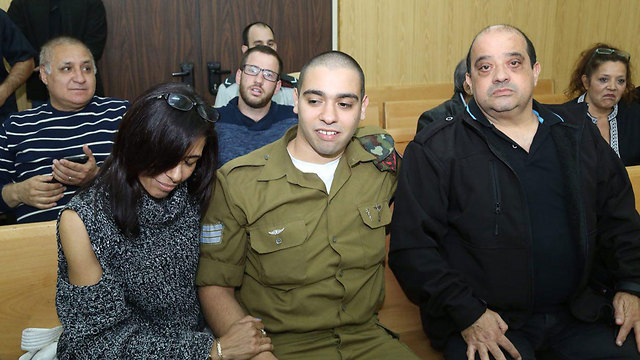
Military prosecution appeals lenient sentence given to Azaria
Following decision by the soldier himself to appeal his conviction, the Military Advocate General decides to appeal 18-month sentence; Azaria was convicted of manslaughter after shooting dead a wounded Palestinian terrorist in Hebron
The Military Advocate General on Tuesday filed an appeal against the lenient sentence given to IDF soldier Elor Azaria, who was convicted of manslaughter after shooting dead a wounded Palestinian terrorist in Hebron.
"The proseuction will argue that according to the law, the respondent (Azaria) should receive a harsher sentence, and his punishment should be 36 to 60 months, or the punishment determined by the minority opinion at the military court (30 months)," the appeal stated.
The military court sentenced Azaria to 18 months in prison, with a majority of two judges. The minority opinion held by the third judge argued to hand out a much harsher sentence. The 18-months sentence is half of what the prosecution demanded—no less than three years.
"The ruling fails to continue on the important path paved by the verdict," the military prosecution wrote in its appeal. "The respondent received a lenient sentence that is not in line with his actions and the severity of these actions, is not in line with the level of punishment common in similar cases, and furthermore, is not in line with the level of punishment common in less severe cases.
"The court itself considered the respondent's actions gravely, placing them at the highest level of severity. In its sentencing, the court should have expressed the important moral, public and social message that must be taught to IDF soldiers and society at large."
The appeal went on to note that: "In its verdict, the military court delivered a decisive and clear message about the sanctity of life and the purity of arms, and emphasized that the needless killing of a person, even if he is a terrorist, is illegal, morally wrong and goes against the IDF's values."
Initially, the military prosecution was leaning towards settling for the lenient sentence as it came alongside a harsh conviction. But Azaria's own appeal of his sentence, alongside the resignation of most of his defense team, led the prosecution to reconsider.
Three of Azaria's four lawyers—including leading counsel Besserglick, as well as Ilan Katz and Karmit Scheiber—tended their resignation last week after the soldier and his family decided to appeal the sentence against the advice of the three litigators, who favored asking to mitigate his sentence or requesting pardon from the president.
Azaria's remaining lawyer, Yoram Sheftel, leveled harsh accusations against the Military Advocate General, claiming that Brig. Gen. Sharon Afek "threateningly blackmailed" the defense time.
"What led to the dramatic change in the position of the other litigators was a meeting with the head military prosecutor on Sunday, in which we were told 'if you don't file an appeal, neither will the IDF,'" Sheftel claimed in a press conference on Wednesday.
He attacked the tit-for-tat proposal, saying, "This is an outrageous assertion with a moral aspect—threats and extortion."
Sheftel appealed the manslaughter conviction on behalf of Azaria last week, claiming there was evidence the judges had allegedly ignored, as well as claiming the investigation by the IDF's Criminal Investigation Division (CID) was biased in a way that established the suspicions against Azaria.











